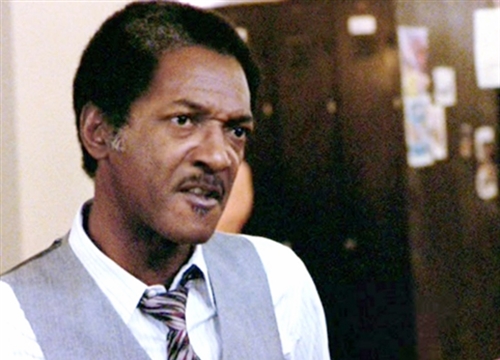Richard Wershe Jr. walked into a Michigan prison as a teenager in the late 1980s after being convicted of cocaine trafficking. Monday morning, at age 51, he was finally free, released from a halfway house in Kissammee, Fla., in the central part of the state, two days after his birthday.
His fiance, who he has known since childhood, flew from Michigan to meet him. They plan to live in Metro Detroit.
In an email to Deadline Detroit, the Florida Department of Correction said: "Richard Wershe was released today from TTH of Kissimmee Community Release Center after completing his sentence in accordance with Florida law."

Richard Wershe Jr. goes free after three decades behind bars.
It's been a decades-long story riddled with intrigue and puzzlement. "White Boy Rick," as he became known in the media, was a white kid doing business in a predominately black city, and served far more time than any of his bigger counterparts in the drug game. His story eventually became the subject of a book, a documentary and a Hollywood film starring Matthew McConaughey, who played Wershe's father.
Wershe got into the drug game after becoming an informant for the FBI and Detroit Police at age 14. He helped put some major drug players behind bars. Eventually, he started selling drugs himself and was charged with possessing multi-kilos of cocaine.
In the early 1990s, Wershe cooperated with the FBI while behind bars and helped set up a sting that netted a string of crooked cops. The FBI posed as drug traffickers and money launders, who asked cops from Detroit and the suburbs to help protect fake shipments of dope and money.
The sting also resulted in charges against Mayor Coleman A. Young's niece Cathy Volsan and her father Willie Volsan, who helped recruit the cops. Charges were dropped against Cathy, who had dated Wershe before he went off to prison. But Willie Volsan was convicted in the case and went off to prison.
Wershe caught the wrath of Mayor Young, who referred to him publicly as a "snitch."

Mug shots from 1988
After that, Wershe was taken out of the state prison system and put in the witness protection program to serve out his life sentence in the federal system. It was while in a federal prison in Florida that he got charged with being part of a car theft ring. He says he didn't know it was a criminal enterprise until near the end.
After that, he was removed from the witness protection program, only to return to Michigan to serve out his sentence.
Paroled in Michigan
In July 2017, he was paroled. But the state of Florida insisted he serve time for his charges there, instead of allowing him time served. By that time, he had served 30 years behind bars.
All along, FBI agents and the U.S. Attorney's Office tried to help Wershe go free. He never received one day off for his cooperation with the FBI, something that many in law enforcement saw as particularly unusual and puzzling.

Gil Hill as Inspector Todd in "Beverly Hills Cop" (1984).
Wershe supporters started referring to him as a political prisoner, saying he had gone against the power establishment in Detroit including the mayor and detective-turned council member Gil Hill, who almost got caught up in the FBI sting in the early 1990s.
"I think there is no doubt that it's related to my cooperation about Gil Hill and about police corruption in Detroit," Wershe told WDIV in 2018.
Hill met in a Hyatt Regency hotel room in Dearborn with undercover FBI agents, who were posing as money launderers trying to move drug cash through legitimate Detroit businesses. They told Hill they wanted him to introduce them to business people in Detroit.
After one meeting, Hill never bit. The Detroit News later published parts of the transcripts of that meeting with the feds, one of whom asked Hill why he wasn't running for mayor.
Hill, who was on the council at the time, explained that he didn't want to run because he had far too many skeletons in the closet and the press would have a field day. Hill, who died in 2016, ended up running unsuccessfully for mayor against Kwame Kilpatrick in 2001.

Kym Worthy
Wayne County Prosecutor Kym Worthy, who was a close friend of Hill, went on a crusade to keep Wershe behind bars. She portrayed him -- many say falsely -- as a drug kingpin who was a danger to society. Some in the Wershe camp, including retired FBI agent Gregg Schwarz, accused her of politics and carrying out a vendeta for the people in the power establishment.
After Hill died in 2016, Worthy stopped opposing Wershe's parole. She said it was because of some Supreme Court rulings that addressed concerns about life sentences for people convicted as teens and sentenced to life.
Three Decades of Change
Wershe re-enters a world far different than the one he knew when he went to prison in the 1980s.
But he did get taste of the outside world in recent months at the halfway house.
People who know Wershe are convinced he'll stay out of trouble.
"I'm confident he'll do well when released," Schwarz, a retired FBI agent, who regularly talks to Wershe and has worked deligently for decades to try and get his release, told Deadline Detroit in May.
In a Facebook posting late Monday morning, Schwarz wrote:
"Rick will be free this morning. All of years of so many conversations about so many topics have come to this day. His case is the classic example of how a group of City officials collude for years to silence, pressure, and manipulate the morals of a City and State. Best of Luck"
Related:
Lengel: Watching 'White Boy Rick' with Family of Richard Wershe Jr. Is Surreal, Sept. 14, 2018


 by
by







